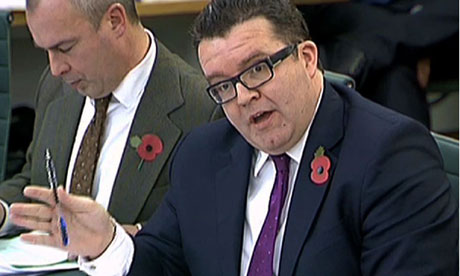Lawyers fear select committee criticism could prejudice fair trials if former executives are charged

Labour MP Tom Watson putting questions to James Murdoch during the culture, media and sport select committee hearing into phone-hacking. Photograph: AFP/Getty Images
Pressure is being applied on the Commons select committee reporting into phone hacking to hold back from challenging the testimony of key News International witnesses by parliamentary lawyers who fear the MPs could prejudice individuals' chances of a fair trial.
The risk from criticism in the culture, media and sport committee's forthcoming report is especially high if executives from the newspaper group are charged with perverting the course of justice.
It is understood pressure is being applied by nervous parliamentary clerks, concerned that the all-party committee could create a gross miscarriage of justice, leading to the collapse of a trial.
A parliamentary counsel has been present at every drafting session of the select committee and it is possible a formal legal opinion will be sought before the report is published.
Committee members were to receive a clerk's second draft for consideration over Easter, with the aim of publication in May. The committee met just before the start of the Easter recess to go through the report line by line.
It is possible that the committee will simply neutrally set out the facts, as relayed to the committee and in evidence to the Leveson inquiry, alongside an accompanying statement that the select committee can reach no conclusion on the evidence relating to Coulson and Brooks pending any legal action.
But this device is regarded by some committee members as unsatisfactory. It is pointed out that none of the select committee witnesses has been charged.
The big issue for the committee remains whether to condemn James Murdoch as someone who is not a fit and proper person to run a public company. The issue has less immediate political impact after Murdoch's resignation as chairman of BSkyB, even though he remains a board member.
Committee members have been impressed by a letter sent to the committee by Murdoch seeking to explain his behaviour. Some MPs regarded the letter as so well pitched that it is a sign that he has been informed internally of the arguments developing within the committee.
There have been complaints within the committee that News International has been selectively briefing committee members, but overall tensions within the committee have been controlled as all sides wrestle with the threat of contempt.
The risk from criticism in the culture, media and sport committee's forthcoming report is especially high if executives from the newspaper group are charged with perverting the course of justice.
It is understood pressure is being applied by nervous parliamentary clerks, concerned that the all-party committee could create a gross miscarriage of justice, leading to the collapse of a trial.
A parliamentary counsel has been present at every drafting session of the select committee and it is possible a formal legal opinion will be sought before the report is published.
Committee members were to receive a clerk's second draft for consideration over Easter, with the aim of publication in May. The committee met just before the start of the Easter recess to go through the report line by line.
James Murdoch on Tuesday resigned as chairman of BSkyB, prompting speculation that he was expecting to be sharply criticised in the report.
A political source aware of the committee's discussions said: "The committee members face a dilemma. They need to be careful to publish a report that will not prejudice possible court proceedings while publishing something that is seen as credible. Arguably this report is very important for the parliamentary select committee system, and no one wants to throw away months of work by the committee."
Two former News International executives who have given evidence to the committee, Rebekah Brooks and Andy Coulson, have been arrested by the police, but not charged.
Both have already claimed their chances of securing a fair trial have been damaged by evidence given at the Leveson judicial inquiry into media ethics. It is feared they could repeat the claim that their human rights have been infringed if the select committee report challenges their credibility as witnesses.
But some committee members are reluctant to pin blame on other News International executives, including former legal officer Tom Crone, and Colin Myler, the former News of the World editor. They have not been arrested. Equally, James Murdoch has not been arrested.
But this device is regarded by some committee members as unsatisfactory. It is pointed out that none of the select committee witnesses has been charged.
The big issue for the committee remains whether to condemn James Murdoch as someone who is not a fit and proper person to run a public company. The issue has less immediate political impact after Murdoch's resignation as chairman of BSkyB, even though he remains a board member.
Committee members have been impressed by a letter sent to the committee by Murdoch seeking to explain his behaviour. Some MPs regarded the letter as so well pitched that it is a sign that he has been informed internally of the arguments developing within the committee.
There have been complaints within the committee that News International has been selectively briefing committee members, but overall tensions within the committee have been controlled as all sides wrestle with the threat of contempt.
